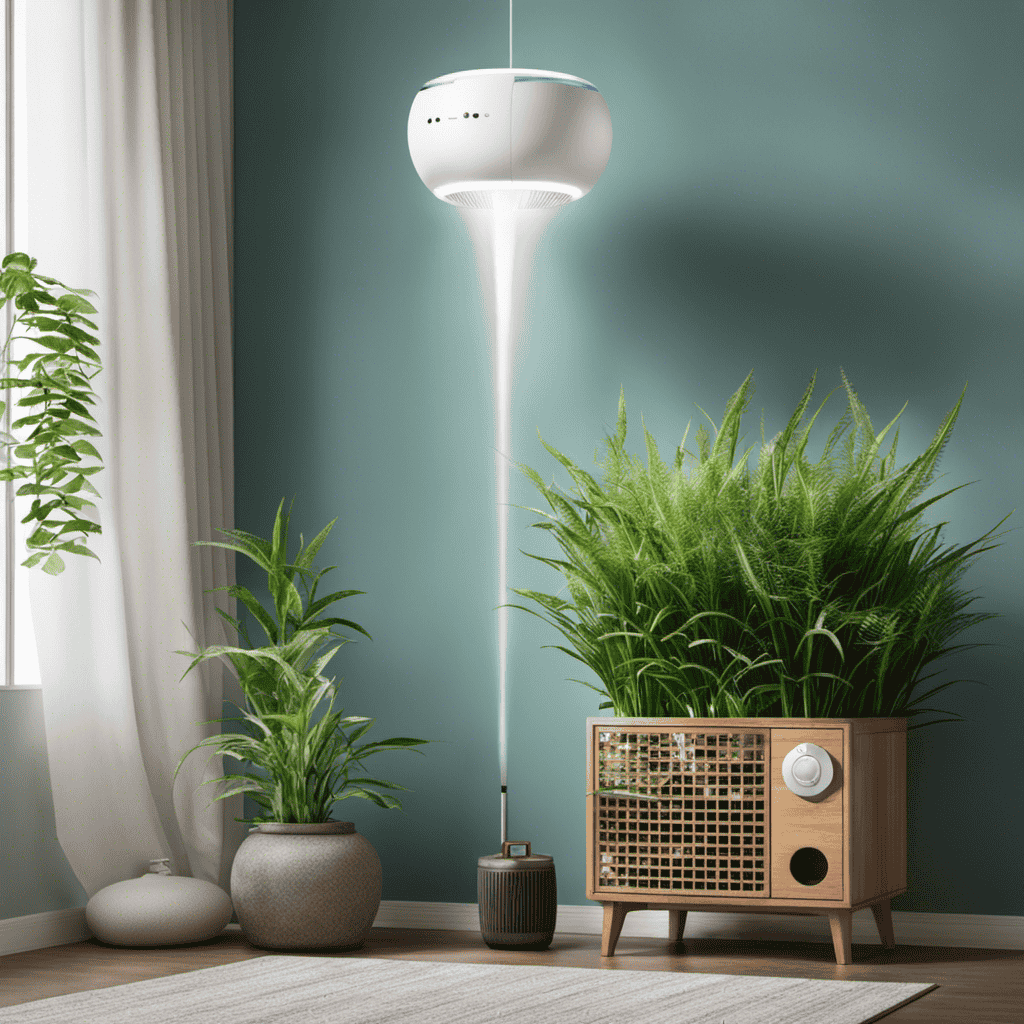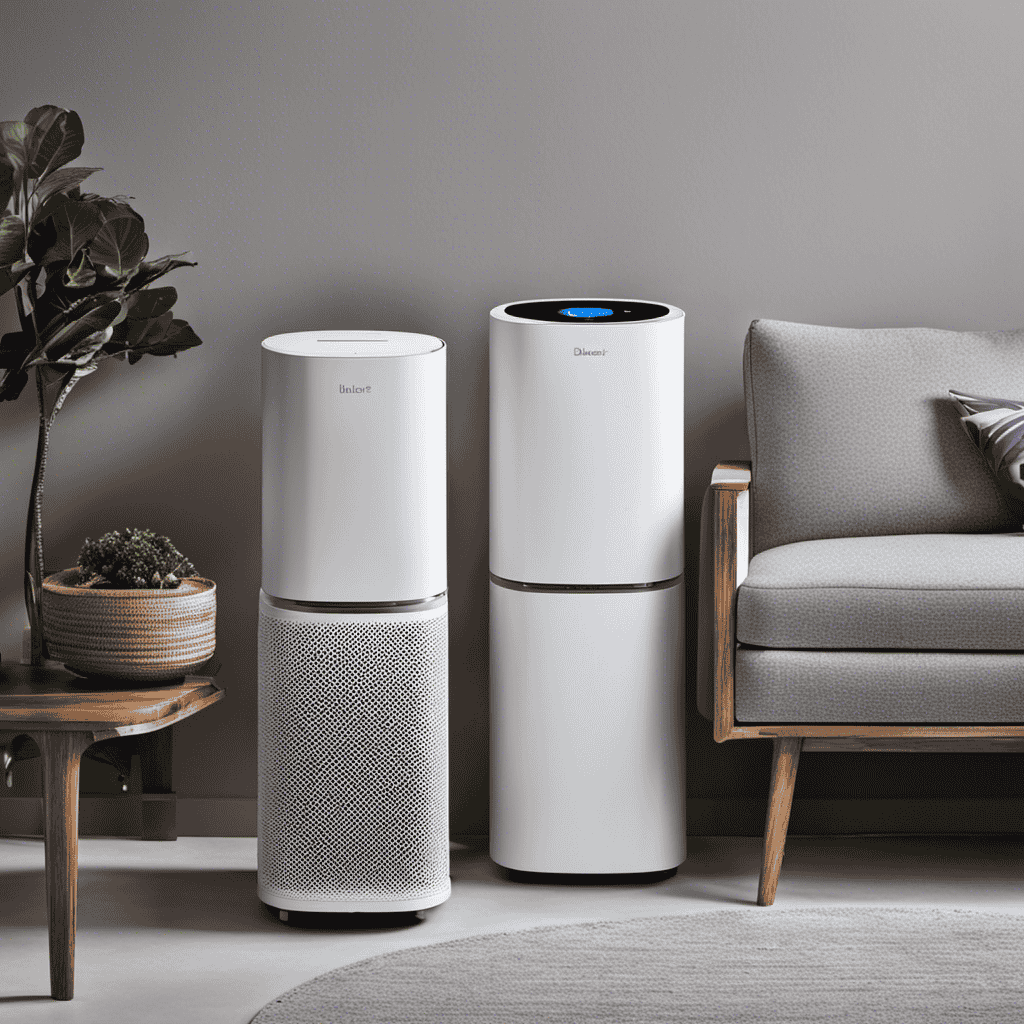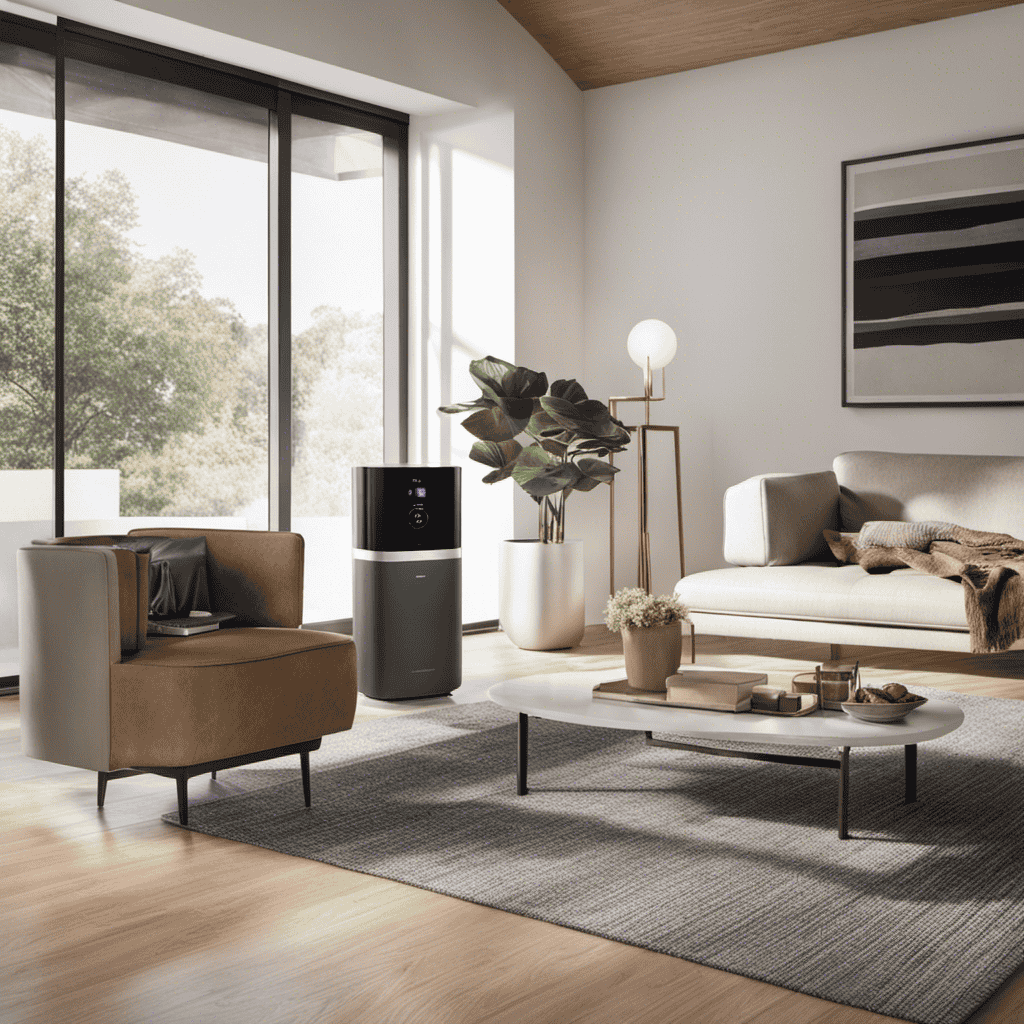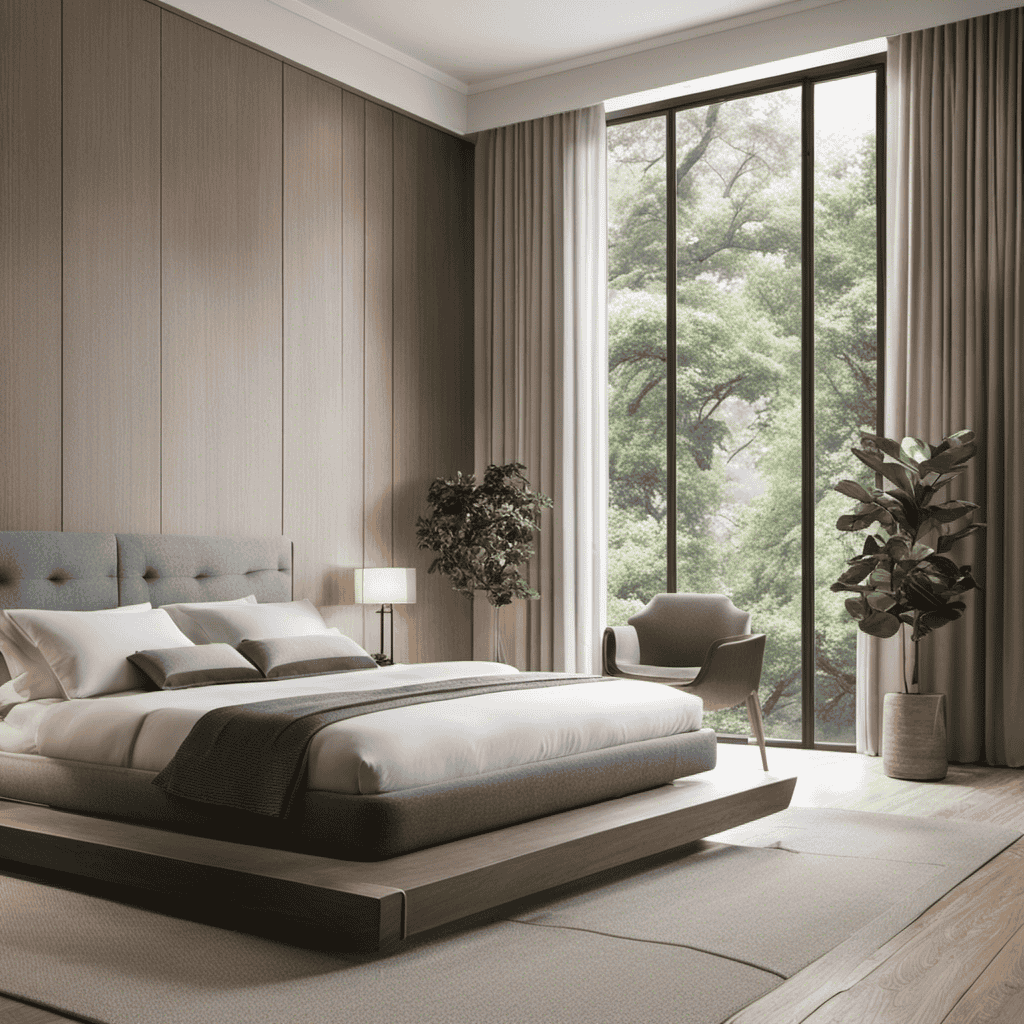As someone deeply interested in air quality, I frequently catch myself contemplating a timeless query: Is an air humidifier or an air purifier more beneficial? These gadgets, akin to two halves of a whole, are designed to enhance the indoor air quality we rely on.
In this article, we will delve into the importance of indoor air quality, explore the functions and benefits of air humidifiers and purifiers, weigh their pros and cons, and discuss the factors to consider when choosing between the two.
So, let’s embark on this informative journey together and make an informed decision.
Key Takeaways
- Indoor air quality is important for health and well-being.
- Air humidifiers increase moisture levels in the air and alleviate symptoms of dryness.
- Air purifiers remove allergens, pollutants, and odors from the air, creating a cleaner and healthier environment.
- Regular maintenance, such as cleaning or replacing filters, is crucial for optimal performance of air purifiers.
The Importance of Indoor Air Quality
The importance of indoor air quality cannot be overstated, as it directly affects our health and well-being. Proper ventilation plays a crucial role in maintaining good air quality indoors. Without adequate ventilation, indoor spaces can become a breeding ground for harmful pollutants such as dust, allergens, and volatile organic compounds (VOCs). These pollutants can cause a wide range of health problems, including allergies, respiratory issues, and even more severe conditions like asthma.
In fact, poor indoor air quality has been linked to an increased risk of developing respiratory infections and cardiovascular diseases. Understanding the impact of air quality on our health is essential in order to take the necessary steps to improve it.
One way to improve air quality is by using air humidifiers, which will be discussed in the next section.
Understanding Air Humidifiers
Understanding how air humidifiers work can help you determine if they are the right choice for your needs.
Air humidifiers are devices that increase the moisture levels in the air, making it more comfortable to breathe. They work by emitting water vapor or steam into the air, which then increases the humidity.
This can be especially beneficial in dry climates or during the winter months when the air tends to be drier. Air humidifiers can help alleviate symptoms of dry skin, dry throat, and dry eyes. They can also help reduce static electricity and prevent wood furniture from cracking.
However, it is important to note that air humidifiers are different from air purifiers. While air purifiers help remove pollutants and allergens from the air, air humidifiers focus solely on increasing humidity levels. Therefore, if you are looking to improve air quality and remove pollutants, an air purifier may be a better choice.
Exploring Air Purifiers
When it comes to improving indoor air quality, air purifiers can be a great solution. The benefits of air purifiers include removing allergens, pollutants, and odors from the air, creating a healthier and more comfortable living environment.
There are different types of air purifiers available, such as HEPA filters, activated carbon filters, and ionizers, each with their own advantages and limitations.
Regular maintenance, such as cleaning or replacing filters, is important to ensure optimal performance and longevity of air purifiers.
Benefits of Air Purifiers
One of the main advantages of air purifiers is that they help remove harmful pollutants from the air.
Air purifiers are beneficial for those with allergies and asthma as they can significantly reduce the triggers that aggravate these conditions.
By filtering out allergens such as pollen, dust mites, pet dander, and mold spores, air purifiers create a cleaner and healthier indoor environment.
This can lead to a decrease in allergy and asthma symptoms, including coughing, sneezing, wheezing, and shortness of breath.
Moreover, air purifiers also help remove other pollutants like smoke, odors, and chemicals, improving overall air quality.
It is important to choose a purifier with a HEPA filter, as they are highly effective in capturing airborne particles.
With their ability to remove harmful pollutants and improve air quality, air purifiers provide significant benefits for individuals suffering from allergies and asthma.
Types of Air Purifiers
To choose the right air purifier, you should consider factors such as the size of the room, the type of pollutants you want to target, and your specific needs and preferences.
There are several types of air purifiers available in the market, each with its own set of features and benefits. Here are some common types of air purifiers:
-
High-efficiency particulate air (HEPA) filters: These filters are highly effective in capturing particles as small as 0.3 microns, including dust, pollen, pet dander, and smoke.
-
Activated carbon filters: These filters are excellent for removing odors, gases, and chemicals from the air.
-
Ultraviolet germicidal irradiation (UVGI) purifiers: These purifiers use UV light to kill bacteria, viruses, and other microorganisms.
-
Electrostatic precipitators: These purifiers use an electrostatic charge to attract and trap particles.
It is important to note that the effectiveness of air purifiers may vary depending on the type of pollutants and the size of the room. Therefore, it is essential to choose an air purifier that is suitable for your specific needs.
Maintenance of Air Purifiers
Now that we know about the different types of air purifiers, let’s discuss the maintenance of these devices. One crucial aspect of maintaining air purifiers is regularly cleaning or replacing the filters. Air purifier filters trap pollutants and particles, and over time, they can become clogged and less effective. By cleaning or replacing the filters, you ensure that your air purifier continues to provide clean and healthy air. Troubleshooting air purifiers is also important. If your air purifier is not working properly, it could be due to issues like a clogged filter, a malfunctioning fan, or a problem with the electrical connection. By troubleshooting these problems, you can keep your air purifier running smoothly and efficiently.
To help you understand the maintenance of air purifiers better, here’s a table outlining some common troubleshooting steps and maintenance tasks:
| Common Issues | Troubleshooting Steps | Maintenance Tasks |
|---|---|---|
| Air purifier not turning on | Check power source and connections | Clean or replace filters |
| Weak airflow | Check for a clogged filter or fan obstruction | Vacuum or wash filters |
| Strange odors | Clean the unit and filters | Replace filters if necessary |
| Loud noises | Check for loose or damaged parts | Lubricate moving parts if needed |
Pros and Cons of Air Humidifiers
When it comes to air humidifiers, there are several key points to consider.
First, the benefits for health cannot be overlooked. Humidifiers can help alleviate dry skin, dry eyes, and even respiratory issues like allergies or asthma.
However, it’s important to be aware of the potential risks associated with humidifiers, such as the growth of mold or bacteria. Therefore, proper maintenance and cleaning are essential to ensure the safe and effective use of humidifiers.
Humidifier Benefits for Health
Using a humidifier can help relieve dry skin and prevent respiratory issues. The benefits of using a humidifier are numerous, especially when it comes to our health. Here are some key advantages:
- Adds moisture to the air, preventing dryness of the skin and lips.
- Alleviates symptoms of allergies and asthma by keeping the air moist.
- Reduces the risk of respiratory infections, as dry air can make our airways more vulnerable to viruses and bacteria.
- Eases congestion and soothes irritated nasal passages, helping us breathe easier.
The effects of dry air on our health can be detrimental. It can lead to dry skin, irritated eyes, and even nosebleeds. Additionally, dry air can worsen respiratory conditions such as allergies and asthma. By using a humidifier, we can counteract these negative effects and improve our overall well-being.
However, it’s important to be aware of the potential risks associated with humidifiers.
Potential Risks of Humidifiers
Dry air can lead to an increase in dust mites and mold growth, which can pose potential health risks. When the air lacks moisture, it creates an ideal environment for these allergens to thrive.
Dust mites are microscopic creatures that feed on dead skin cells and can trigger allergies and asthma symptoms. Mold, on the other hand, releases spores that can cause respiratory issues and allergic reactions. This can be particularly problematic for individuals with pre-existing respiratory conditions.
The risks associated with dust mites and mold growth include coughing, sneezing, wheezing, itchy eyes, and skin irritation. To mitigate these health concerns, it is important to maintain proper humidity levels in indoor spaces.
Using a humidifier can help add moisture to the air, reducing the risk of dust mites and mold growth, thus promoting better respiratory health.
Humidifier Maintenance and Cleaning
To keep your humidifier running efficiently and prevent the buildup of harmful bacteria, regularly cleaning and maintaining it is essential. As a responsible owner of a humidifier, I have found that proper cleaning and maintenance not only prolong the lifespan of the device but also promote a healthier indoor environment.
Here are a few tips to help you with humidifier cleaning and preventing mold:
- Empty and rinse the water tank daily to remove any residual particles or minerals.
- Use a mild cleaning solution or vinegar to disinfect the tank and other removable parts.
- Regularly replace the filter to ensure optimal performance and prevent mold growth.
- Clean the external surface of the humidifier to remove any dust or dirt that may accumulate over time.
Pros and Cons of Air Purifiers
Air purifiers can effectively remove allergens and pollutants from the air, but they may not be as effective at humidifying the air.
Indoor air pollution is a growing concern, with studies linking it to various health issues. Air purifier technology has advanced significantly in recent years, offering various filtration methods to capture and eliminate airborne particles.
These devices use filters, such as HEPA filters, to trap allergens like dust, pollen, and pet dander, as well as pollutants like smoke and mold spores. However, when it comes to humidifying the air, air purifiers may not provide the same level of effectiveness as dedicated humidifiers.
While some air purifiers have built-in humidifying features, they typically lack the capacity and efficiency of dedicated humidifiers. Therefore, if your primary concern is improving indoor air quality, an air purifier can be a valuable investment.
But if you are specifically looking to increase humidity levels, a dedicated humidifier would be a better choice.
Factors to Consider When Choosing an Air Humidifier
When choosing an air humidifier, there are several factors to consider. First, you should think about the size of the humidifier. It’s important to choose one that is appropriate for the room you plan to use it in. If the humidifier is too small, it may not effectively humidify the space. On the other hand, a humidifier that is too large may create excess moisture.
Another factor to consider is the noise level of the humidifier. This is especially important if you plan to use it in a bedroom or living room where quiet is important. Some humidifiers can be quite noisy, which can be disruptive to sleep or relaxation.
Maintenance requirements are also important to think about. Some humidifiers require more frequent cleaning or filter replacements than others. It’s important to choose one that fits with your lifestyle and the amount of time you are willing to dedicate to maintenance tasks.
Finally, you should also consider the price range of the humidifier. There are a wide range of options available at different price points, so it’s important to choose one that fits within your budget.
Factors to Consider When Choosing an Air Purifier
One important factor to consider when choosing an air purifier is its filtration system. The quality of the filtration system determines how effectively the purifier can remove pollutants from the air.
There are different types of filters available, such as HEPA filters, activated carbon filters, and ionizers. HEPA filters are highly effective in capturing small particles like dust, pollen, and pet dander. Activated carbon filters are great for removing odors and harmful gases. Ionizers use charged particles to attract and remove pollutants from the air.
When choosing an air purifier, it is important to consider the specific features that you require, such as the size of the room it can cover, the noise level, and the maintenance requirements.
Some popular air purifier brands include Dyson, Honeywell, and Blueair.
Making an Informed Decision: Humidifier or Purifier?
To make an informed decision between a humidifier or purifier, you should consider your specific needs and the benefits each device offers.
-
Humidifier:
-
Increases humidity levels in the air to alleviate dryness and potential health issues.
-
Helps relieve dry skin, chapped lips, and sinus congestion.
-
Can reduce the risk of airborne viruses and bacteria.
-
Can improve sleep quality by reducing snoring and easing dry throat and nasal passages.
-
Purifier:
-
Removes indoor air pollutants such as dust, pollen, pet dander, and mold spores.
-
Improves overall air quality and reduces allergy symptoms.
-
Can help alleviate respiratory conditions like asthma and allergies.
-
Some purifiers have additional features like odor elimination and air ionization.
When comparing features, consider your specific needs and the type of indoor air pollutants you want to address. A humidifier is ideal for increasing moisture levels and promoting comfort, while a purifier is more focused on removing contaminants from the air.
Ultimately, the choice depends on your personal preferences and the desired outcome for your indoor environment.
Frequently Asked Questions
Can an Air Humidifier and Purifier Be Used Together for Optimal Indoor Air Quality?
Using an air humidifier and purifier together can optimize indoor air quality. While a humidifier adds moisture to the air, a purifier removes pollutants. This combination can help alleviate dryness and improve overall air cleanliness.
How Often Should I Clean and Maintain My Air Humidifier or Purifier?
Regular maintenance is important for optimal performance of air humidifiers and purifiers. Common problems include mold growth, mineral buildup, and clogged filters. Troubleshooting these issues can improve indoor air quality and extend the lifespan of the devices.
Can an Air Purifier Remove Allergens and Pollutants From the Air?
Can an air purifier effectively remove allergens and pollutants from the air? Yes, it can. When comparing air purifiers to air humidifiers, the former is specifically designed to filter out particles and improve air quality.
Can an Air Humidifier Help With Dry Skin and Respiratory Problems?
Yes, an air humidifier can help with dry skin and respiratory problems by adding moisture to the air. However, an air purifier can also be beneficial as it filters out allergens and pollutants.
Are There Any Potential Health Risks Associated With Using an Air Humidifier or Purifier?
There are potential health risks associated with using air humidifiers and purifiers, but there are also benefits and drawbacks. It is important to research and consider these factors before deciding which option is better for your specific needs.
Can a Humidifier or Air Purifier Help with Allergies?
If you suffer from allergies, you may be wondering whether a humidifier versus air purifier is the better option for relief. A humidifier adds moisture to the air, which can help with dry nasal passages. On the other hand, an air purifier can help remove allergens like dust, pet dander, and mold spores from the air.
Conclusion
In conclusion, both air humidifiers and purifiers play crucial roles in improving indoor air quality.
While humidifiers add moisture to the air, purifiers remove pollutants and allergens.
Each has its pros and cons, and the choice ultimately depends on individual needs and preferences.
So, which is better? Is it about creating a comfortable environment with proper humidity levels, or is it about eliminating harmful particles from the air we breathe?
The answer lies in understanding our specific requirements and making an informed decision based on that.










